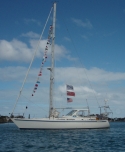An opportunity to sit or upgrade your American Amateur radio license is again being offered in NZ.
This year there will be only one sitting in 2018 - at the Whangarei Cruising Club on April 16, a Monday.
Anyone interested should study the details on www.yit.nz and go to Gulf Harbour Radio and then Library and look down in the second group of topics for the subject. Those that are NZ citizens or who have permanent residency in NZ do not have to bother as you can sit the NZ test - which is in fact a little simpler! However visitors should make use of this opportunity f you are sailing further west. Once you leave the South pacific you will not have the benefit of N's Maritime Radio so having a ham license enables you to make contact with others in an emergency. It also gives you the opportunity to talk to people around the world which is rather good on long ocean passages. We have met some wonderful people in many countries with ham radio.
If you want to take part in this exam opportunity please contact Patricia at Gulf Harbour Radio so that papers will be available. You also need to apply for a special identifying number from the FCC before arriving for the test. Patricia will send you details on this. You do not have to be American to sit this test. Please contact me if you need further information. patricia@ghradio.co.nz or 09 4245765 or mobile 02102473044.
Some of you may remember Sherry from Soggy Paws. She has prepared the following and if you want the study aid advice please contact patricia. Or download the attached.
Instructions for Amateur License Examinees - SSCA /LARC VEC
Whangarei, New Zealand - 2018
An amateur radio (“ham”) license is issued to an individual and not a vessel. An amateur operating from a
vessel is called a “maritime mobile” amateur operator. The bands used by the amateur radio service are
different than those used for marine communications so a marine radio license does not apply.
The Federal Communications Commission (FCC) of the USA does not conduct amateur (ham) license tests
directly but use “Volunteer Examiners” (VE’s). VE’s are managed by volunteer organizations called Volunteer
Examiner Coordinators (VEC’s). The VEC group is the liaison to the US Federal Communications Commission
(FCC), who actually issues the license.
The US is a member of the International Telecommunications Union (ITU) of the UN, so a US amateur radio
license is recognized by the 193 ITU member states around the world. An individual does not have to be a
US citizen to possess a US amateur license but cannot be a representative of a foreign government.
The Seven Seas Cruising Association has joined with the Laurel Amateur Radio Club VEC group to accredit
"at large" volunteer examiners amongst the SSCA membership so testing can take place during SSCA
events. VEs for this session are: Patricia Dallas (K6AHS), Scott Gillen (N0HOK), and Steve Watford (AB4TN) (s/v
Northstar). Questions about the testing or licensing should be directed to Patricia at chameleonhouse@xtra.co.nz and Sherry McCampbell at sherry@svsoggypaws.com
Specifics:
In the US, amateur licenses are now issued at three levels or classes: Technician, General and Extra. Exams
for each class are called “elements” and must be taken and passed in sequence. There is no longer any
Morse code proficiency required.
All testing is multiple choice with questions from a publicly-available question pool. The tests are
computer-generated. Questions are randomly selected, and the sequence of multiple-choice answers varies
between each test version.
License Class and Proficiency Requirement:
Technician Element 2 - 35 questions
General Element 3 - 35 questions
Extra Element 4 – 50 questions
A passing score is 70% or better (26 questions for the Tech and General, and 37 questions for the Extra)
In order to access world-wide cruiser support nets and free amateur radio email (Winlink), an individual
aboard a yacht needs to pass two written exams (Elements 2 & 3) in order to receive a General Class
license.
These two tests can be taken on the same day, and often are. Material is similar, but the question pool is
different for each element.
The test date for 2019 has been set. We are fortunate to have the same three examiners. So, mark April 15 in your diary.
American 'Ham' Exams
Category:
